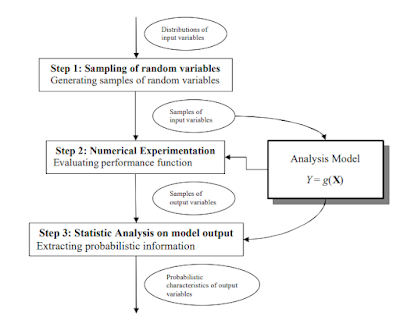Monte Carlo is a simulation approach that uses numerous runs
of a nondeterministic simulation based on a random number generator to solve
complicated problems.
Deterministic approaches solve equations or systems of
equations to arrive at a fixed answer, which is the same every time the
computation is conducted.
Monte Carlo techniques, on the other hand, employ a random
number generator to choose distinct pathways, resulting in a varied solution
each time.
When the deterministic equations are unknown, there are a
large number of variables, and the issue is probabilistic in nature, Monte
Carlo techniques are applied.
Games of chance, nuclear simulations, quantum effects
difficulties, and weather forecasting are all examples of situations where
Monte Carlo techniques are routinely used.
Monte Carlo techniques are often employed in machine
learning and memory simulations in artificial intelligence to produce more robust
responses and to depict, for example, how memory evolves.
Compared to deterministic approaches, Monte Carlo methods
may be much more computationally demanding.
Monte Carlo is a popular AI technique for games like
checkers, chess, and Go.
These games (particularly Go) contain a high number of
potential moves at each stage.
Monte Carlo tree search is a methodology that use the MC
method to continually play the game while making a random move at each stage.
The AI system eventually learns the optimum moves for a
given game circumstance.
Monte Carlo tree search AIs have a proven track record of
beating other AI gaming algorithms on a regular basis.
Find Jai on Twitter | LinkedIn | Instagram
You may also want to read more about Artificial Intelligence here.
See also:
Emergent Gameplay and Non-Player Characters.
References & Further Reading:
Andrieu, Christophe, Nando de Freitas, Arnaud Doucet, and Michael I. Jordan. 2003. “An Introduction to MCMC for Machine Learning.” Machine Learning 50: 5–43.
Eckhard, Roger. 1987. “Stan Ulam, John von Neumann, and the Monte Carlo Method.” Los Alamos Science 15 (Special Issue): 131–37.
Fu, Michael C. 2018. “Monte Carlo Tree Search: A Tutorial.” In Proceedings of the 2018 Winter Simulation Conference, edited by M. Rabe, A. A. Juan, N. Mustafee, A. Skoogh, S. Jain, and B. Johansson, 222–36. Piscataway, NJ: IEEE.





